Want a heads up when a new story drops? Subscribe here.
Two years into the pandemic, the world is faced with a resurgence of cases, pushing governments to tighten containment measures. The prospects of the events and meetings industry remain uncertain, as Covid-19 brought travel to a screeching halt, pushing event marketing experts to get creative.
Table of Contents
The Challenge for Event Marketing
With travel restrictions and airport closures in place, the industry has been largely decimated by the impacts of the novel coronavirus. Infrared and thermal scanners, protective equipment, sanitization, cleaning, social distancing, and reduced queuing and touchpoints at airports will shape our experiences post Covid-19.
Many are wary of traveling, whether for leisure or business, and this trend is likely to continue. According to the Harris Poll, about half of the Americans, or 49% say they will fly within 6 months of the curve flattening.

With air travel down 60% and containment measures reintroduced and extended repeatedly, the events industry has been one of the hardest hit by the coronavirus crisis. The threat of future outbreaks and lockdowns makes for a challenging environment for live events. But despite the widespread uncertainty driven by Covid-19, the industry is already adapting to new realities.
Part of the reshaping is going digital and holding virtual events to make up for missing in-person interactions. The search for alternatives is ongoing, opening up opportunities and bringing innovative concepts to life such as organizing events where visitors interact through virtual avatars.
The New Event Marketing Landscape
Faced with uncertainty about the pandemic’s end, however, industry professionals need to make tough decisions. Should they invest in a virtual or in-person business or are hybrid events the future? To answer this question, let’s look at some of the trends and audience perceptions that may shape the future of the events industry and its marketing
Growing Public Interest in Virtual Events
A global survey run by AnyRoad and including data from Conde Nast explored audience perceptions of virtual events amidst and post the pandemic. According to Senior Vice President of Commercial Marketing & Events for Conde Nast, Eric Johnson, “There is a much higher aptitude for engaging in this virtual format” (Impact Plus).

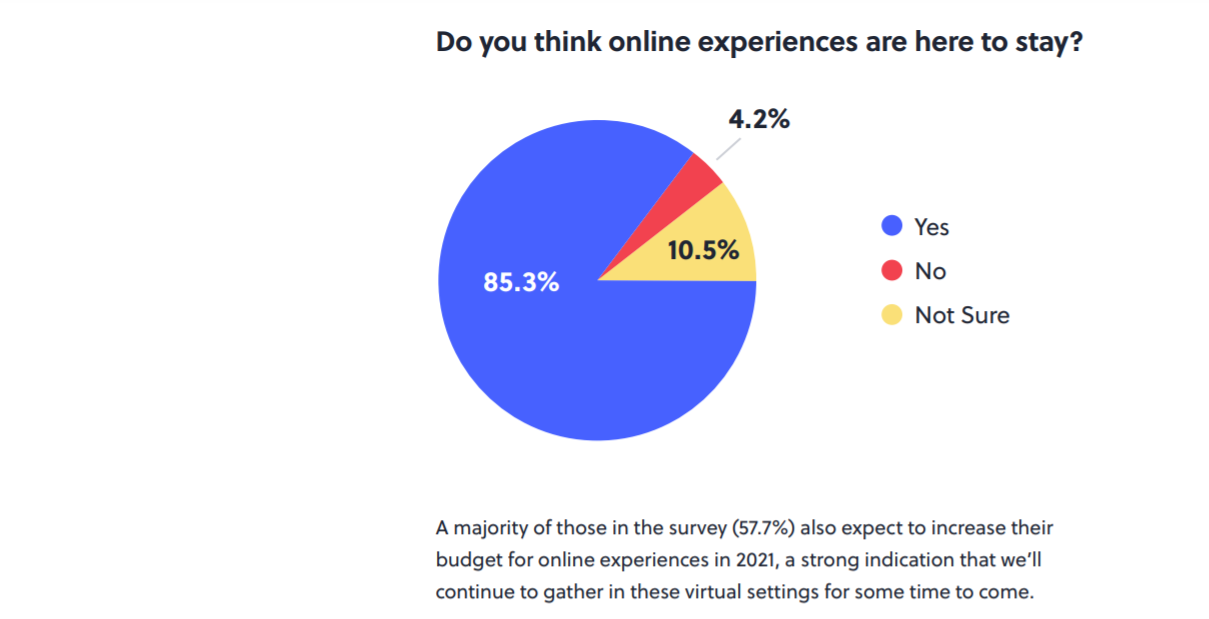
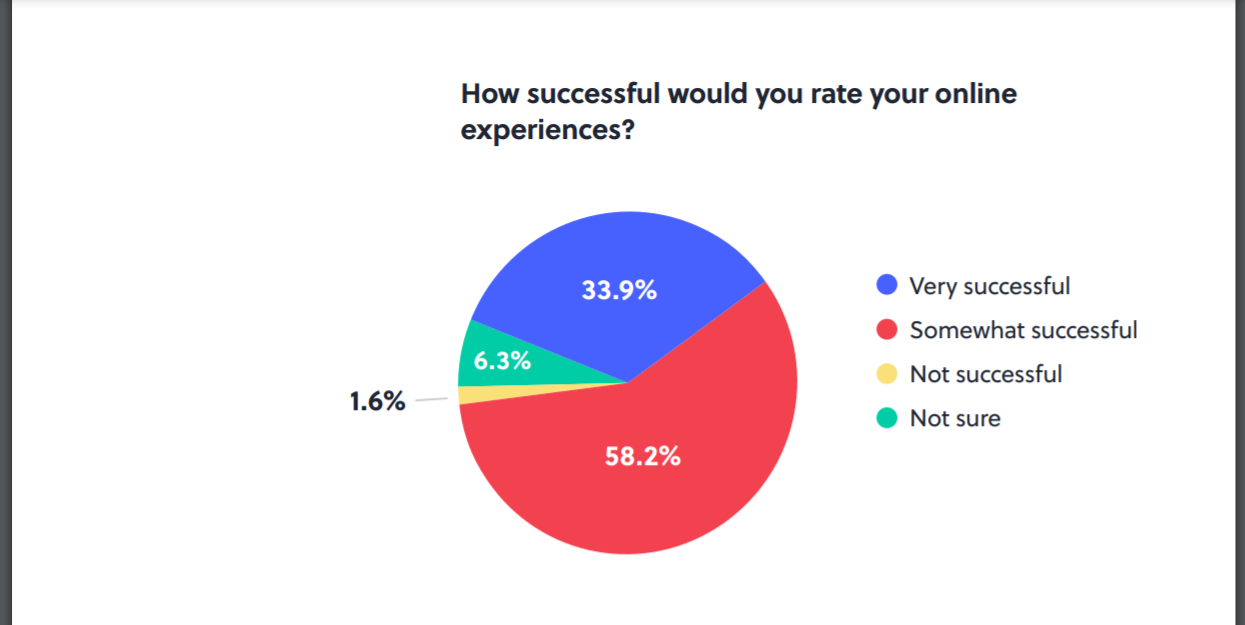

Indeed, the survey found that 70% of their audience has already attended a company event and the vast majority of respondents (90 %) would still consider a virtual offering once things go back to normal (Digiday).
Virtual Conferencing Part of the New Event Marketing Future
Many scientists and academics believe that conferences should continue to be virtual. A Nature poll involving over 900 participants found that 74% of respondents appreciate online conferences and believe academic meetings should have a virtual component or be virtual post-Covid-19.
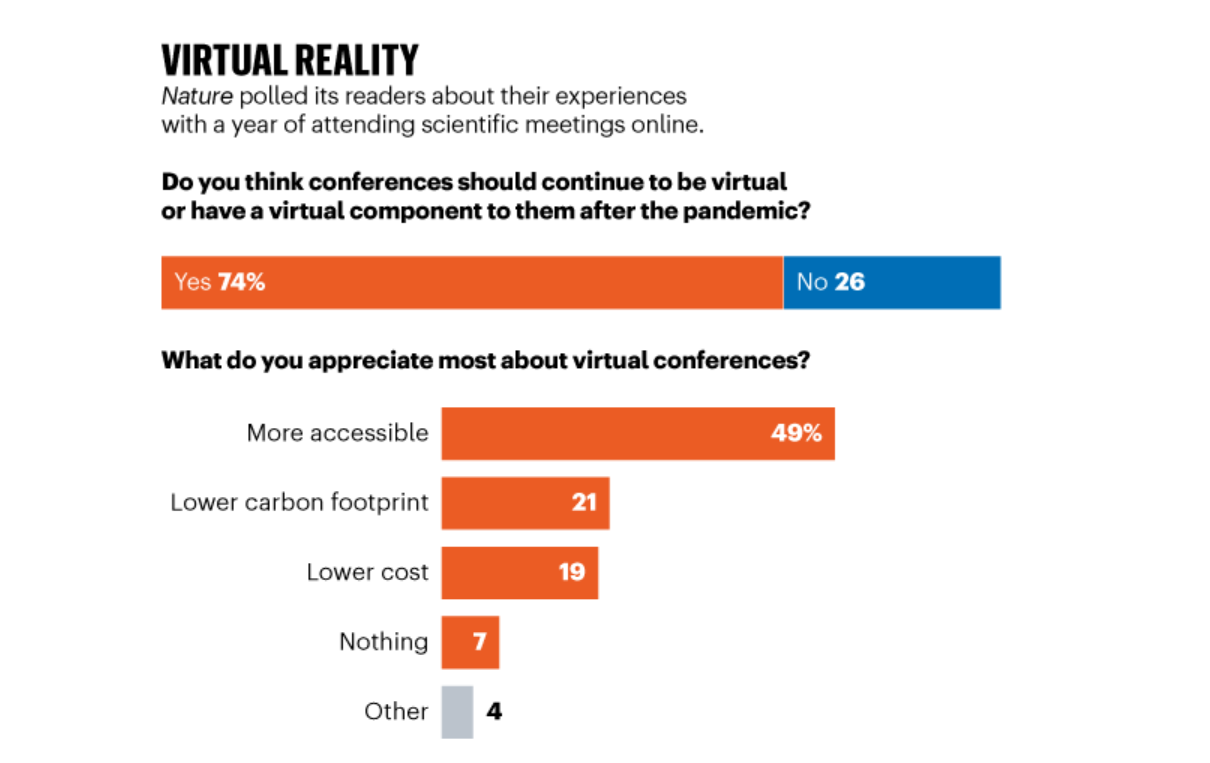
Participants were also asked what they appreciate the most about online scientific meetings. About half of all academics (49%) said they are more accessible. Factors such as lower cost (19 %) and lower carbon footprint (21 %) were second and third most cited.
When asked about the biggest drawbacks, 69 % of respondents agreed that it is networking opportunities that they miss the most. “I do appreciate the realm of possibilities offered by online conferences,” one participant explains.
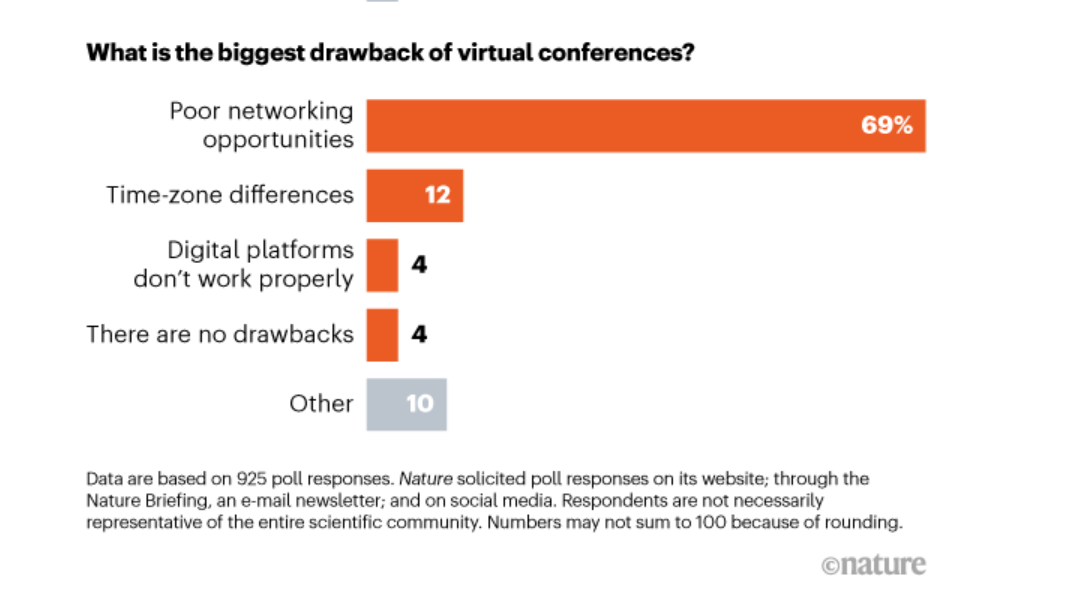
“I really miss the opportunity to meet people and to interact with friends and colleagues,” he added. Other drawbacks that were cited include digital platforms not working properly (4%) and time-zone differences (12 %).
Still, virtual conferences offer some real benefits, especially for scientists who find it prohibitive to jet around the world. Academics with disabilities also find it easier and more convenient to attend from home.
In-person meetings could also disadvantage scientists from countries with low vaccine rollouts. In addition to the risk of facing travel restrictions, they will be more vulnerable to infection, explains Joan Larrahondo, Assistant Professor of Civil Engineering at the Pontifical Xavierian University in Bogotá (Nature).
Zoom Fatigue & Event Marketing
Despite growing public and academic interest in online events, there are signs of virtual event fatigue among audiences, partly because the market is already oversaturated- making it particularly tough for event marketing specialists.
Video conferencing platforms have become busy places for meetups, activities, on-demand and live-streamed events, and gatherings, with millions of meetings scheduled daily. And while video conferencing helps bridge the gap between countries and people, scientists warn that video meetings fatigue people.

According to Jeremy Bailenson, Ph.D., Department of Communication Professor at Stanford, with video chats we need to put more effort into sending and receiving nonverbal signals. To show others that you agree with them, you put thumbs up or do an exaggerated nod. When everyone is framed from the shoulders up, it is difficult to read body language and hand gestures.
When we cannot rely on nonverbal cues, quality interactions rely on intense attention to words. This increases the “cognitive load as you’re using mental calories in order to communicate,” explains Bailenson (Stanford News).

Zoom fatigue is taxing our brains and emotions and results from overuse. With social distancing protocols keeping us apart, we spend long hours on videoconferencing and events platforms.
And amidst a global crisis that is unprecedented in scope and breadth, the coronavirus is no longer just a novel disease. For many, it causes financial hardship, emotional exhaustion, and feelings of loneliness and social isolation. These stressors also play a role in why we feel so mentally drained and fatigued.
New Virtual Personas & Event Marketing
Based on a survey involving 700 participants, event platform Bizzabo identified 6 different personas and their motivations to attend virtual events. “Understanding your attendee personas can help to customize and tailor aspects of your events”, explains Co-Founder of Bizzabo Alon Alroy (Exhibitor).
The 6 universal personas that the team identified are:

1. Experience seeker
There experience seekers (7%) are those who attend virtual events for the built-in activities they can join. Before the pandemic, they used to travel often to meet new people and have fun. Experience seekers sign up for virtual events to socialize, participate in giveaways, and receive gifts.

2. Internet socializer
Internet socializers (8%) enjoy virtual events and spend most of the time socializing with other attendees.
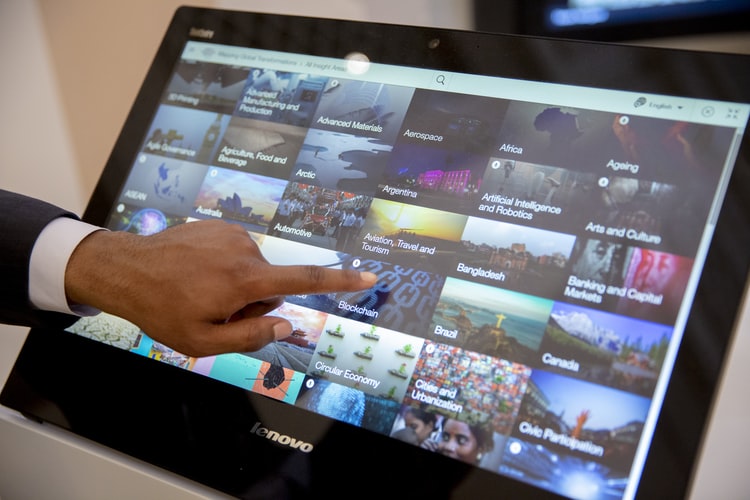
3. Strategic networker
Strategic networkers (10%) are mainly interested in making and maintaining business connections. Learning is not their main motivation. It is networking. What worries them most is that virtual events offer fewer opportunities to socialize and make connections.
4. Radical networker
Radical networkers account for 18 % of all attendees. The social aspect of events and networking serves as their main motivation. They miss in-person events and the opportunity to socialize and spark a spontaneous conversation.
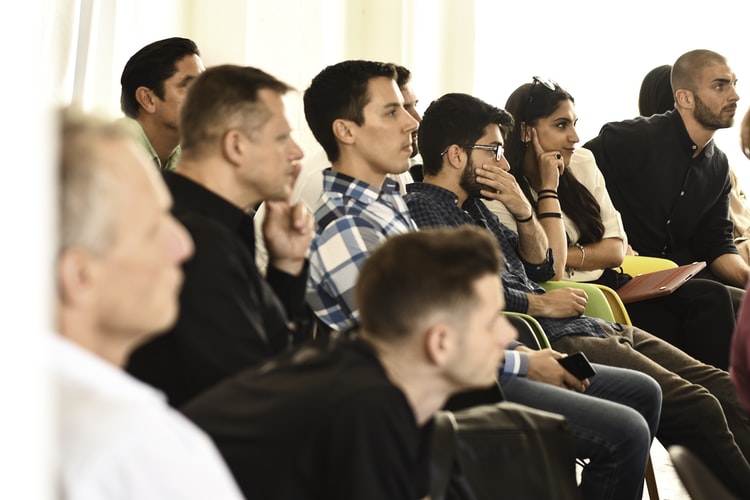
5. Mandated learner
Mandated learners attend virtual events only because their company requires them to do so. They account for 25 % of all attendees.

6. Solo learner
Solo learners, who are the largest group (32%), sign up for multiple inexpensive and free events to gain industry and work-related knowledge.
Each of the six personas has different needs, perceptions, and motivations. Virtual seminars, conferences, and meetings have their share of fans that enjoy the opportunities that online events offer.
For others, however, they cannot be a substitute for in-person events and cannot replicate all aspects of the experience.
What this means for the events marketing industry is that the future of events is hybrid. When it comes to virtual events, marketers will benefit from aligning events with attendees’ personas and motivations.
Designing experiences around attendee personas will result in increased retention and engagement as well as more personalized event experiences and refined marketing messages, Alroy explains.
The Future of Events & Event Marketing is Hybrid

A major study conducted by the Global Association of the Exhibition Industry and event platform Explori polled more than 9,000 participants from 30 countries. The study focused on the experiences of attendees and exhibitors at digital and hybrid events and how they feel about the lack of in-person events.
The findings show that the majority of people still prefer in-person events but there is a growing interest in hybrid and virtual experiences. Live events and B2B conferences are seen as an opportunity for networking, with 83%t of attendees and 77% of exhibitors showing a strong preference for in-person events. The study also found that 79% of respondents have at least some interest in joining a hybrid event (UFI).
The study findings offer insights to industry leaders as they plan ahead. Most people show a clear preference for live events and doing business in person. “Future digital events marketing will not seek to replicate the in-person experience”, says Explori’s Managing Director Sophie Holt. Instead, virtual events can help engage “communities, guide audiences through unfamiliar territory and meet customers where they are,” Hold adds (Explori)
In Conclusion
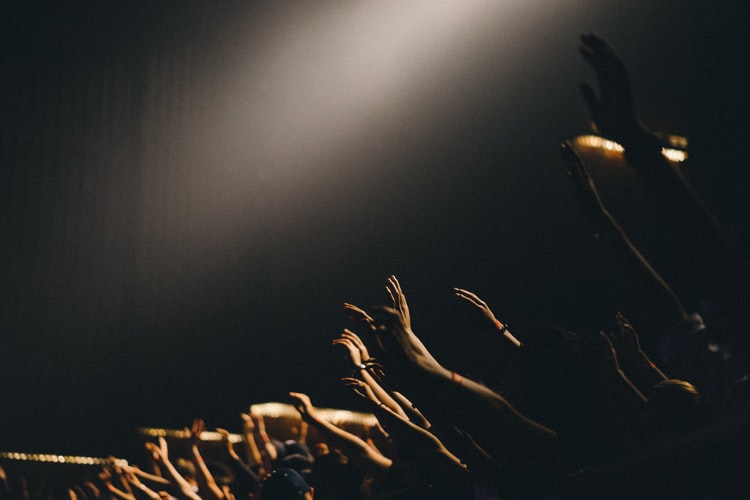
The quality of virtual events has improved significantly since the pandemic, with marketers seeking creative approaches to beat virtual fatigue. Virtual experiences are here to stay but live events are certain to come back when the pandemic subsides.
We need and crave in-person interactions. The biggest challenge for event marketing experts during lockdowns and social distancing is the loss of human connection. Being part of a community, having a sense of belonging, and socializing are fundamental traits that make us human. Event specialists will need to be creative in delivering solutions that serve the new landscape and the needs of their customers.














